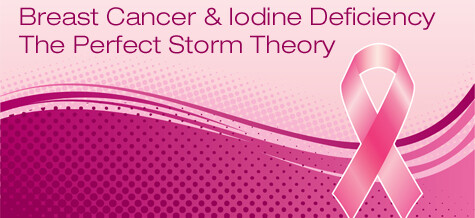
Okay, so how many conversations do you hear about this topic? Believe me when I say it’s important! In Lynne Farrow’s book The Iodine Crisis I recently read that thyroid and breast disease “skyrocketed between 1970 and 2000.” Why would that be, I thought? I continued reading. Apparently iodine was looked at as a “universal medicine” going back thousands of years, and used primarily in it’s earlier form as seaweed.
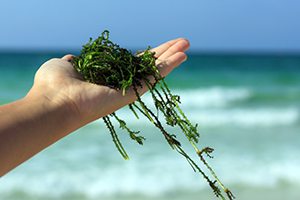
Seaweed (fresh) is very rich in iodine, but not always easy to access.
So where did iodine go and why are we deficient and what is the connection to breast cancer? While Ms. Farrow explores a multitude of health issues in relation to iodine deficiency, for today’s post I’m focusing on her studies regarding Breast Cancer. I know her information will knock your socks off, it did mine! Keep reading…
Who is Lynne Farrow?
The author is herself a breast cancer survivor, a journalist, researcher, former college professor and speaker. She currently serves as Director of Breast Cancer Choices (a nonprofit organization dedicated to scrutinizing and reporting of the evidence for breast cancer procedures and treatments). She also founder of Breast Cancer Think Tank, a forum for professionals, patients and lay-people to report new findings about breast cancer as well as review old information. Lynne is also the editor of www.IodineResearch.com and came up with the Perfect Storm Theory of Breast Cancer. To read more about this theory, click here: www.breastcancerchoices.org/perfectstorm.html
To order her book, click on the book below:
Why aren’t we Getting Enough Iodine in our Diets?
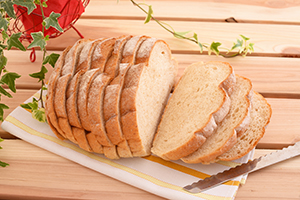
In the 1970s, iodine was replaced with bromides and introduced into our baked goods.
Apparently, in 1948, a research team determined that iodine was dangerous, even though earlier opinions countered that iodine was considered “traditional” medicine and used liberally for treating everything from syphilis to breast cancer. All of a sudden, iodine was banned from further research, and iodine-fortified bread disappeared in the 1970’s, a time when I was a still developing teenager. Hmm…
In addition, bromide was introduced into our flour and our baked goods. Bromide-related chemicals started showing up as well in other products like fire retardants, pesticides, personal care products, certain foods and sodas and drugs. Why is this important? Because the more one is exposed to bromides the more one’s iodine metabolism is inhibited. It does take years for bromines, the elements of bromide, to accumulate in the body but some of them “don’t metabolize out of the body as easily as other toxins,” adds Ms. Farrow. Thus, more iodine deficiency.
Ms. Farrow further informs that “the mistake in one influential paper purged the benefits of iodine for two generations of medical students” and certainly at the cost to millions of otherwise healthy people, particularly women. Her findings also revealed researchers in least five countries who had made the connection between iodine deficiency and breast tumors.
Here’s what else I learned in this incredibly information packed book:
- Iodine requirements increase for girls going through puberty
- Iodine receptors in the breast keep the milk ducts and other tissue performing optimally
- Iodine can help detoxify fluids in the breasts and eliminate cysts which harbor tumors
- Iodine helps fibrocystic disease go away. When blocked, breast disease returns. (It’s widely known in the medical community that benign breast disease increased the risk of breast cancer so eliminating fibrocystic disease is important!)
- In the early 1900s, iodine salves were widely used for breast and other pain.
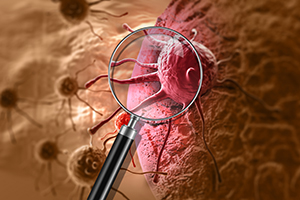
Research has shown that cancer cells are reduced in both size and quantity when the right amounts of iodine are introduced to the body.
Further studies proved that when a group of breast cancer patients were given iodine after their biopsies:
- Cancer cells died
- Cancer cell division was slowed
- A reduction in size and number of tumor-producing blood vessels
- Estrogen receptors were desensitized (80% of breast cancer diagnoses are estrogen positive)
While most scientists agree that iodine deficiency doesn’t “cause” breast cancer, it certainly plays a very large role.
How to Get Enough Iodine in our Diets?
For years we’ve heard that table salt should be limited or avoided for our health. Clearly we need iodine but can we get enough in our iodized salt? The author notes that the iodine begins evaporating as soon as salt is opened and depletes over time. In addition, Dr. David Brownstein allows that refined salt is actually toxic for our bodies. Unrefined salt is a much healthier substance like:
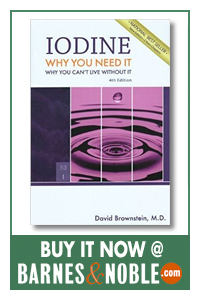 Dr. David Brownstein allows in his book, Iodine, Why you Need It, Why you Can’t Live Without It, (5th Edition, by the way!) that “iodine is the safest of all of the essential trace elements, can be administered safely for long periods of time and in daily amounts as high as 100,000 times the Recommended Daily Allowance by the FDA.” He notes that some iodine-containing drugs, such as amiodarone, are prescribed by physicians and are extremely toxic as they are actually inorganic iodone. Our thyroid hormones are organic containing-substances.
Dr. David Brownstein allows in his book, Iodine, Why you Need It, Why you Can’t Live Without It, (5th Edition, by the way!) that “iodine is the safest of all of the essential trace elements, can be administered safely for long periods of time and in daily amounts as high as 100,000 times the Recommended Daily Allowance by the FDA.” He notes that some iodine-containing drugs, such as amiodarone, are prescribed by physicians and are extremely toxic as they are actually inorganic iodone. Our thyroid hormones are organic containing-substances.
According to Dr. Brownstein, author of 11 books, “After 20 years of practicing medicine, I can say that it is impossible to achieve your optimal health if you do not have adequate iodine levels. I have yet to see any item that is more important to promoting health or optimizing the function of the immune system than iodine.” What I love about Dr. Brownstein’s perspectives is that he is one who integrates the best of western and holistic medicine!
Believe me when I say that these two books are comprehensive and I can’t possibly do them justice in this single post. In addition to breast disease, Both Ms. Farrow and Dr. Brownstein inform in easy to understand ways the other various health issues that can be helped with the proper amounts of iodine in one’s body. Some of these others include: Graves’ disease, Hashimoto’s disease, ADD/ADHD, Fatigue, Goiters, Hemorrhoids, Headaches and Migraines, Ovarian Disease, Hypertension, Infections, Prostate Disorders, and Sebaceous Cysts to name a few.
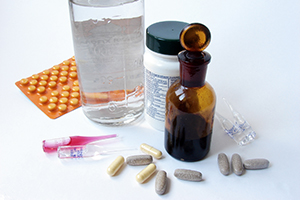
Dosages vary for each individual, so refer to these books or a medical professional for proper guidance.
In reading both of these books, I can comfortably say that any and all of your questions regarding iodine will be answered. In addition, both authors give thorough recommendations for testing, supplements and dosages. Most of us don’t have access to seaweed, chalk full of iodine and because our bodies are so finely tuned, I wouldn’t dare to self-prescribe. However, that’s where these two books come in.
I had lived with painful fibrocystic breasts from the time I was in my teens until my surgery 30 years later. Do I believe I could have had relief with proper iodine supplementation? I do. Do I believe I could have avoided a breast cancer diagnosis? Perhaps, but it sure would have been worth it to have had this information and at least been proactively supplementing. To me, this kind of information opens yet another door to whole health and less suffering.
If you have a history of chronic illness, or any of your loved ones are suffering from any of the health issues I’ve mentioned, I urge you to read one or both of these books. If you don’t glean good information from them, I’ll buy them back from you.
Peace and Great Breast Health!
![]()
If you “Like” this post, I’d be thrilled if you’d share it.
OCT
